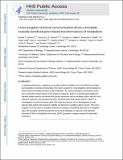Cross-Kingdom Chemical Communication Drives a Heritable, Mutually Beneficial Prion-Based Transformation of Metabolism
Author(s)
Jarosz, Daniel F.; Walker, Gordon A.; Ung, W. Lloyd; Lancaster, Alex K.; Rotem, Assaf; Weitz, David A.; Bisson, Linda F.; Brown, Jessica Conrad; Lindquist, Susan; Datta, Manoshi Sen; Chang, Amelia N.; Newby, Gregory Arthur; ... Show more Show less
DownloadLindquist_Cross-kingdom.pdf (2.956Mb)
PUBLISHER_CC
Publisher with Creative Commons License
Creative Commons Attribution
Terms of use
Metadata
Show full item recordAbstract
In experimental science, organisms are usually studied in isolation, but in the wild they compete and cooperate in complex communities. We report a system for cross-kingdom communication by which bacteria heritably transform yeast metabolism. An ancient biological circuit blocks yeast
from using other carbon sources in the presence of glucose. [GAR[superscript +]], a protein-based epigenetic element, allows yeast to circumvent this glucose repression and use multiple carbon sources in the presence of glucose. Some bacteria secrete a chemical factor that induces [GAR[superscript +]]. [GAR[superscript +]] is advantageous to bacteria because yeast cells make less ethanol, and is advantageous to yeast because their growth and long-term viability is improved in complex carbon sources. This crosskingdom communication is broadly conserved, providing a compelling argument for its adaptive value. By heritably transforming growth and survival strategies in response to the selective pressures of life in a biological community, [GAR[superscript +]] presents a unique example of Lamarckian inheritance.
Date issued
2014-08Department
Massachusetts Institute of Technology. Computational and Systems Biology Program; Massachusetts Institute of Technology. Department of BiologyJournal
Cell
Publisher
Elsevier
Citation
Jarosz, Daniel F. et al. “Cross-Kingdom Chemical Communication Drives a Heritable, Mutually Beneficial Prion-Based Transformation of Metabolism.” Cell 158.5 (2014): 1083–1093.
Version: Author's final manuscript
ISSN
00928674
1097-4172